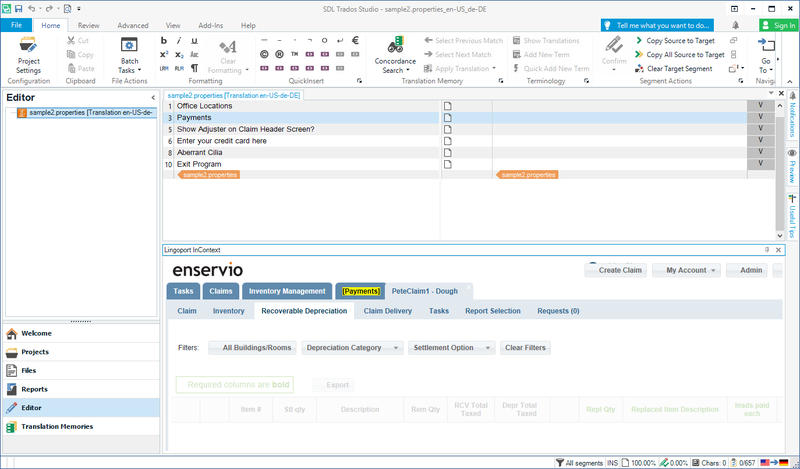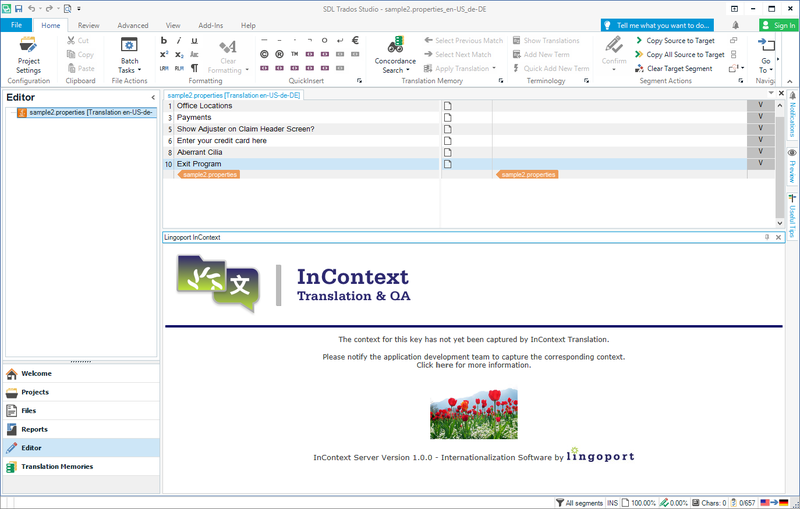Difference between revisions of "Lingoport InContext Plugin"
(→Accessing the Context) |
(→Accessing the Context) |
||
| Line 19: | Line 19: | ||
#If the entry does not have an associated context, a message will appear in the Lingoport InContext pane saying no context found. |
#If the entry does not have an associated context, a message will appear in the Lingoport InContext pane saying no context found. |
||
| − | + | For example, in the image below, <b>Payments</b> is being translated, and that entry has associated context: |
|
[[file:YesInContext.png |800px]] |
[[file:YesInContext.png |800px]] |
||
| − | In the image below, |
+ | In the image below, <b>Exit Program</b> is being translated, and that entry does not have associated context: |
[[file:NoInContext.png |800px]] |
[[file:NoInContext.png |800px]] |
||
Revision as of 19:55, 9 October 2019
Contents
Lingoport InContext Plugin for SDL Trados Studio
Installing the Plugin
- Install SDL Trados Studio: https://www.sdltrados.com/products/trados-studio/free-trial.html
- Exit SDL Trados Studio if it is currently running.
- Download the Sdl.LingoportInContext.Plugin.sdlplugin from the app store: https://appstore.sdl.com/language/app/lingoport-incontext/1027/
- After downloading, click on the downloaded file to execute and follow the install application instructions.
- Launch SDL Trados Studio.
- Verify plugin is there by clicking the Add-Ins tab at the top, then Plug-ins. Verify that Lingoport InContext is in the list and checked.
Accessing the Context
- In SDL Trados Studio, select File->Open->Translate Single Document and browse to an instrumented resource file.
- OK the Translation Memory and Document Settings popup.
- Click on an entry to translate.
- If the entry has an associated context, the entry will appear, highlighted, in the Lingoport InContext pane.
- If the entry does not have an associated context, a message will appear in the Lingoport InContext pane saying no context found.
For example, in the image below, Payments is being translated, and that entry has associated context:
In the image below, Exit Program is being translated, and that entry does not have associated context:
Special Instructions for Resx Files
SDL Trados Studio must be configured to handle resx files:
- Open Trados Studio
- Open the File > Options menu
- Open the File Types > XML: Microsoft .NET Resources > Parser page
- Click the Add... button and enter the following settings:
- Rule type: XPath
- XPath: //data/lingoport
- Translate: Always translatable
- Tag type: structure
- Whitespace: Inherit From Parent
- Click the Edit... button and then Add... a new rule with the following settings:
- Standard: Custom
- Purpose: Match
- Name: Paragraph
- Code: P
- Identifier: paragraph
- Description: A paragraph of text
- Click OK multiple times to save the Structure, Property, and Rule
- The instrumented resx file can now be imported and used.
Uninstalling the Plugin
- Exit SDL Trados Studio if currently running.
- Run the program: C:\Program Files (x86)\SDL\SDL plugin installer\Sdl.Community.SdlPluginInstaller.exe
- Click the Uninstall button associated with the Lingoport InContext Plugin.

